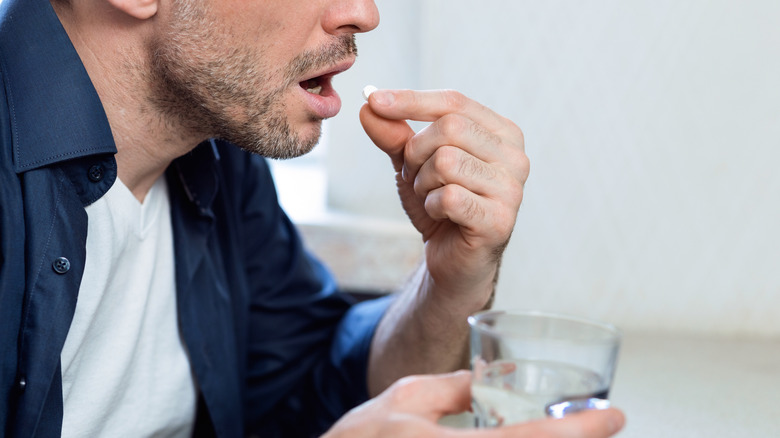What Happens To Your Body When You Drink Alcohol And Take Tylenol
Tylenol, or acetaminophen, is a popular go-to when it comes to reducing a fever or relieving minor aches and pains. More than 600 products contain acetaminophen, ranging from flu medications to sleep aids. In addition, many prescription drugs also contain acetaminophen (via U.S. Food and Drug Administration).
You might find yourself reaching for a couple of Tylenol after a night of drinking, but that might not always be a good idea. One of the main reasons is that your liver metabolizes acetaminophen, and a small byproduct of that process is toxic to your liver. As the liver breaks down acetaminophen, it also creates glutathione, which helps decrease that toxicity. Normally, this isn't a problem — unless you are taking too much acetaminophen. If you consume too many products that contain acetaminophen, it can lead to a buildup of the toxic substance, which could damage your liver, according to the Cleveland Clinic.
Mixing alcohol with acetaminophen can be dangerous
The liver breaks down alcohol. To do this, it creates enzymes that turn alcohol into acetaldehyde, which is a toxic carcinogen. The liver must then convert acetaldehyde into acetate so the body can eliminate it. While the body works to rid itself of acetaldehyde quickly, large amounts of the byproduct can still cause damage to the liver and brain, per Stanford University. Add this negative side effect to those that can occur with taking acetaminophen, and you might end up with an upset stomach, ulcers, or worse, liver damage.
Generally speaking, taking acetaminophen after a night of drinking will not lead to problems, but heavy alcohol use along with taking acetaminophen on a daily basis can lead to liver damage. Keep in mind that more than 1 drink per day for women and 2 daily drinks for men is considered "heavy alcohol use," according to the Cleveland Clinic. Furthermore, the U.S. National Library of Medicine states that it is dangerous for people who drink moderately to take the drug. If you are concerned, ask your doctor if you should be taking it.


